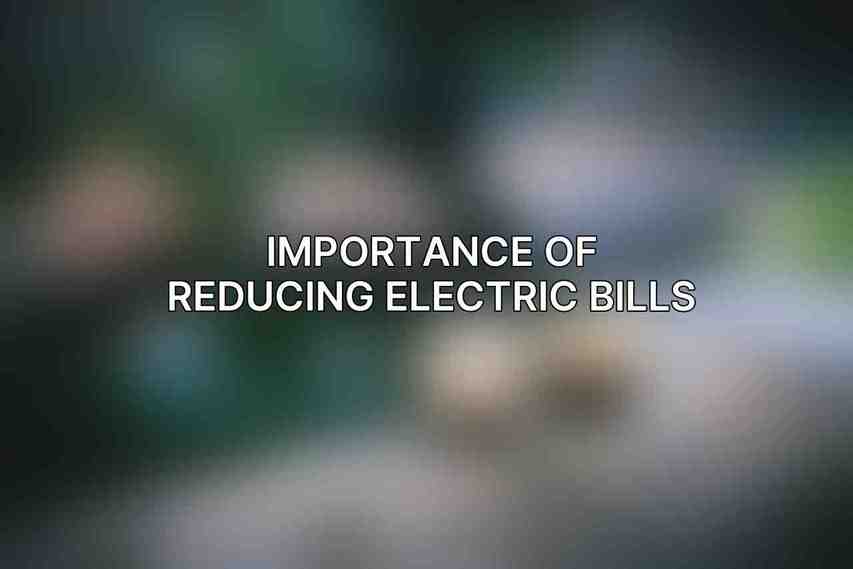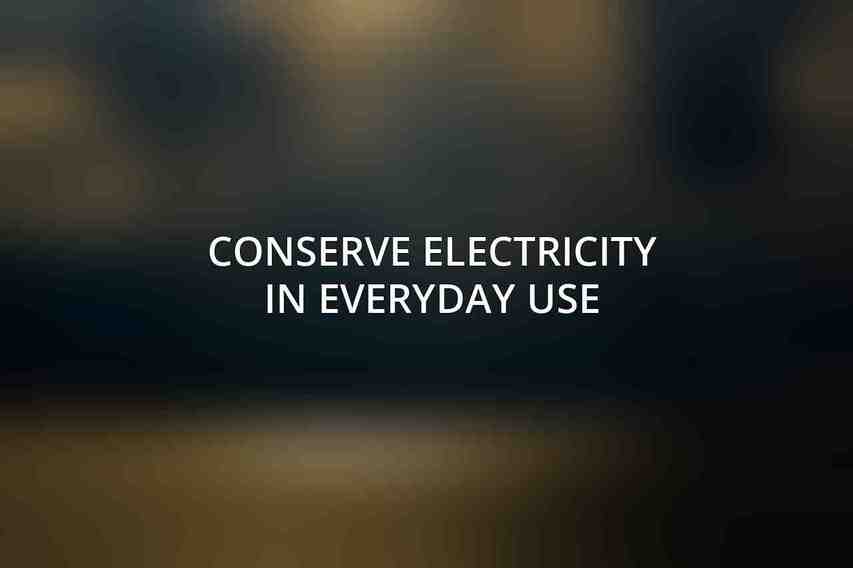Electricity bills can often be a significant portion of monthly expenses for households. In a time where being environmentally conscious is more important than ever, reducing our energy consumption not only helps save money but also benefits the planet. By implementing proven energy-saving techniques, homeowners can significantly lower their electric bills while contributing to a more sustainable future.
Importance of Reducing Electric Bills

Reducing electric bills is not only beneficial for saving money but also plays a vital role in conserving energy and minimizing our carbon footprint. Every kilowatt-hour of electricity saved translates to a reduction in greenhouse gas emissions, helping combat climate change and preserve our environment for future generations.
Overview of Energy-Saving Techniques
Energy-saving techniques encompass a wide range of strategies that can be implemented in homes to reduce electricity consumption. These techniques include optimizing appliance usage, conserving electricity in everyday activities, upgrading to energy-efficient appliances, optimizing home insulation, and taking advantage of utility rebates and programs.
Optimize Appliance Usage
Refrigerators
When it comes to refrigerators, simple adjustments can lead to significant energy savings. Setting the correct temperature, avoiding overcrowding, and cleaning condenser coils regularly are essential practices to ensure efficiency and reduce energy consumption.
Air Conditioners
Efficient use of air conditioners involves utilizing programmable thermostats, sealing air leaks, and utilizing ceiling fans to circulate air effectively. These practices not only save energy but also improve the cooling efficiency of the system.
Washing Machines
To reduce electricity usage with washing machines, opting for cold water washes, running full loads, and choosing energy-efficient models can make a notable difference. Energy Star-rated washing machines are designed to minimize energy consumption while maintaining optimal performance.
Dishwashers
Maximizing the energy efficiency of dishwashers involves running full loads, using air-dry settings, and keeping the filter clean. These practices not only save energy but also extend the lifespan of the dishwasher.
Lighting
Switching from incandescent bulbs to LED or CFL lights, utilizing natural light whenever possible, and installing motion sensors or dimmers are effective ways to reduce energy consumption related to lighting and cut down on electricity costs.
Conserve Electricity in Everyday Use

Unplug Electronics
Electronics continue to draw power even when turned off, contributing to standby energy consumption known as vampire power. Unplugging electronics when not in use or utilizing smart power strips can help eliminate this unnecessary energy usage.
Turn Off Lights
A simple yet effective way to save electricity is by turning off lights when leaving a room or going to bed. Cultivating this habit can lead to significant energy savings over time.
Use Power Strips
Power strips with surge protection offer a convenient way to turn off multiple devices at once, preventing standby power consumption and reducing electricity costs. Using power strips simplifies the process of cutting off power to devices when they are not in use.
Upgrade to Energy-Efficient Appliances
Opting for Energy Star certified appliances and considering energy-efficient upgrades, such as heat pump water heaters, high-efficiency furnaces, solar panels, and smart home devices, can result in long-term energy savings and reduced electricity bills.
Upgrade to Energy-Efficient Appliances
Look for Energy Star Certification
Energy Star certified appliances adhere to strict energy efficiency guidelines set by the Environmental Protection Agency (EPA). By choosing these appliances, homeowners can ensure optimal performance while minimizing energy consumption.
Consider Energy-Efficient Upgrades
Investing in energy-efficient upgrades like heat pump water heaters, high-efficiency furnaces, solar panels, and smart home devices can further enhance the energy efficiency of a home and lead to substantial electricity savings in the long run.
Optimize Home Insulation
Seal Air Leaks
Sealing air leaks around windows, doors, and cracks in walls is essential for maintaining a well-insulated home. By preventing air leaks, homeowners can reduce the workload on heating and cooling systems, resulting in lower energy consumption.
Install Weatherstripping and Caulk
Adding weatherstripping and caulk to gaps and openings helps improve the insulation properties of a home, preventing heat loss in winter and heat gain in summer. Proper insulation leads to energy savings and enhanced comfort indoors.
Add Insulation
Enhancing insulation in attics, walls, and crawl spaces is crucial for maintaining a consistent indoor temperature and reducing the need for excessive heating or cooling. Adequate insulation contributes to lower energy bills and improved energy efficiency.
Take Advantage of Utility Rebates and Programs
Research Available Rebates
Many utility companies offer rebates and incentives for homeowners who make energy-efficient upgrades. Researching and taking advantage of these programs can offset the upfront costs of investments in energy-saving measures.
Participate in Energy Audits
Utility-sponsored energy audits provide valuable insights into a home’s energy usage patterns and areas for improvement. By participating in these audits and conservation programs, homeowners can make informed decisions to optimize energy efficiency and reduce electric bills.
By following these proven energy-saving techniques and making conscious efforts to minimize energy consumption, homeowners can not only reduce their electric bills but also contribute to a more sustainable and environmentally friendly lifestyle. Embracing energy efficiency not only benefits individual households but also plays a crucial role in addressing global environmental challenges. Take the first step towards a greener future by implementing these practical strategies today!
Frequently Asked Questions
1. How can I reduce my electric bill using energy-saving techniques?
There are several proven techniques to reduce your electric bill such as using energy-efficient appliances, turning off lights and electronics when not in use, utilizing programmable thermostats, and ensuring proper insulation in your home.
2. Is it worth investing in energy-saving appliances to reduce my electric bill?
Yes, investing in energy-saving appliances may require an initial upfront cost, but they are designed to consume less energy over time, leading to significant savings on your electric bill in the long run.
3. How important is proper insulation in reducing energy consumption?
Proper insulation is crucial in reducing energy consumption as it helps maintain a consistent indoor temperature, reducing the workload on your heating and cooling systems, ultimately leading to lower energy bills.
4. Are there any simple habits I can adapt to lower my electricity usage?
Yes, simple habits such as turning off lights when leaving a room, unplugging electronics when not in use, and setting your thermostat a few degrees lower during the winter and higher during the summer can have a noticeable impact on reducing your electric bill.
5. Will using power strips help lower my electric bill?
Yes, using power strips to easily turn off multiple electronics at once can help reduce ‘phantom’ energy usage and lower your electric bill by eliminating standby power consumption.

